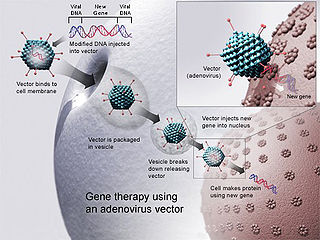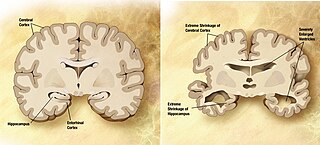Related Research Articles

Gene therapy is a medical technology which aims to produce a therapeutic effect through the manipulation of gene expression or through altering the biological properties of living cells.

Huntington's disease (HD),also known as Huntington's chorea,is an incurable neurodegenerative disease that is mostly inherited. The earliest symptoms are often subtle problems with mood or mental/ psychiatric abilities. A general lack of coordination and an unsteady gait often follow. It is also a basal ganglia disease causing a hyperkinetic movement disorder known as chorea. As the disease advances,uncoordinated,involuntary body movements of chorea become more apparent. Physical abilities gradually worsen until coordinated movement becomes difficult and the person is unable to talk. Mental abilities generally decline into dementia,depression,apathy and impulsivity at times. The specific symptoms vary somewhat between people. Symptoms usually begin between 30 and 50 years of age,and can start at any age but is usually seen around the age of 40. The disease may develop earlier in each successive generation. About eight percent of cases start before the age of 20 years,and are known as juvenile HD,which typically present with the slow movement symptoms of Parkinson's disease rather than those of chorea.

Susan Lee Lindquist,ForMemRS was an American professor of biology at MIT specializing in molecular biology,particularly the protein folding problem within a family of molecules known as heat-shock proteins,and prions. Lindquist was a member and former director of the Whitehead Institute and was awarded the National Medal of Science in 2010.
Oligonucleotides are short DNA or RNA molecules,oligomers,that have a wide range of applications in genetic testing,research,and forensics. Commonly made in the laboratory by solid-phase chemical synthesis,these small bits of nucleic acids can be manufactured as single-stranded molecules with any user-specified sequence,and so are vital for artificial gene synthesis,polymerase chain reaction (PCR),DNA sequencing,molecular cloning and as molecular probes. In nature,oligonucleotides are usually found as small RNA molecules that function in the regulation of gene expression,or are degradation intermediates derived from the breakdown of larger nucleic acid molecules.
Gene silencing is the regulation of gene expression in a cell to prevent the expression of a certain gene. Gene silencing can occur during either transcription or translation and is often used in research. In particular,methods used to silence genes are being increasingly used to produce therapeutics to combat cancer and other diseases,such as infectious diseases and neurodegenerative disorders.

Small interfering RNA (siRNA),sometimes known as short interfering RNA or silencing RNA,is a class of double-stranded RNA at first non-coding RNA molecules,typically 20-24 base pairs in length,similar to miRNA,and operating within the RNA interference (RNAi) pathway. It interferes with the expression of specific genes with complementary nucleotide sequences by degrading mRNA after transcription,preventing translation.

Human genetic enhancement or human genetic engineering refers to human enhancement by means of a genetic modification. This could be done in order to cure diseases,prevent the possibility of getting a particular disease,to improve athlete performance in sporting events,or to change physical appearance,metabolism,and even improve physical capabilities and mental faculties such as memory and intelligence. These genetic enhancements may or may not be done in such a way that the change is heritable.
Antisense therapy is a form of treatment that uses antisense oligonucleotides (ASOs) to target messenger RNA (mRNA). ASOs are capable of altering mRNA expression through a variety of mechanisms,including ribonuclease H mediated decay of the pre-mRNA,direct steric blockage,and exon content modulation through splicing site binding on pre-mRNA. Several ASOs have been approved in the United States,the European Union,and elsewhere.
Tom Maniatis,is an American professor of molecular and cellular biology. He is a professor at Columbia University,and serves as the Scientific Director and CEO of the New York Genome Center.
Trinucleotide repeat disorders,also known as microsatellite expansion diseases,are a set of over 50 genetic disorders caused by trinucleotide repeat expansion,a kind of mutation in which repeats of three nucleotides increase in copy numbers until they cross a threshold above which they become unstable. Depending on its location,the unstable trinucleotide repeat may cause defects in a protein encoded by a gene;change the regulation of gene expression;produce a toxic RNA,or lead to chromosome instability. In general,the larger the expansion the faster the onset of disease,and the more severe the disease becomes.

A neurodegenerative disease is caused by the progressive loss of structure or function of neurons,in the process known as neurodegeneration. Such neuronal damage may ultimately involve cell death. Neurodegenerative diseases include amyotrophic lateral sclerosis,multiple sclerosis,Parkinson's disease,Alzheimer's disease,Huntington's disease,multiple system atrophy,and prion diseases. Neurodegeneration can be found in the brain at many different levels of neuronal circuitry,ranging from molecular to systemic. Because there is no known way to reverse the progressive degeneration of neurons,these diseases are considered to be incurable;however research has shown that the two major contributing factors to neurodegeneration are oxidative stress and inflammation. Biomedical research has revealed many similarities between these diseases at the subcellular level,including atypical protein assemblies and induced cell death. These similarities suggest that therapeutic advances against one neurodegenerative disease might ameliorate other diseases as well.

Gladstone Institutes is an independent,non-profit biomedical research organization whose focus is to better understand,prevent,treat and cure cardiovascular,viral and neurological conditions such as heart failure,HIV/AIDS and Alzheimer's disease. Its researchers study these diseases using techniques of basic and translational science. Another focus at Gladstone is building on the development of induced pluripotent stem cell technology by one of its investigators,2012 Nobel Laureate Shinya Yamanaka,to improve drug discovery,personalized medicine and tissue regeneration.

Jan A. Nolta is an American scientist and the director of the stem cell program at the UC Davis School of Medicine and Institute for Regenerative Cures. She is Scientific Director for the UC Davis Good Manufacturing Practice and editor of the journal Stem Cells. Nolta is known for her work with stem cell-related regenerative medicine. Nolta's current research focuses on treatment of Huntington's disease using mesenchymal stem cells. She was elected a AAAS Fellow in 2013.

Ram I. Mahato is a professor and chairman of the Department of Pharmaceutical Sciences,University of Nebraska Medical Center,Omaha,United States. He was Professor of Pharmaceutical Sciences and Biomedical Engineering at the University of Tennessee Health Science Center,Memphis. He was Research Assistant Professor at the University of Utah,Senior Scientist at GeneMedicine Inc and a postdoctoral fellow at the University of Southern California,Washington University in St. Louis,and Kyoto University. He received a PhD in drug delivery from the University of Strathclyde and BS from China Pharmaceutical University. He is a CRS Fellow,AAPS Fellow,Permanent Member of BTSS/NIH Study section (2009–2013),and ASGCT Scientific Advisor.

Neurodegenerative diseases are a heterogeneous group of complex disorders linked by the degeneration of neurons in either the peripheral nervous system or the central nervous system. Their underlying causes are extremely variable and complicated by various genetic and/or environmental factors. These diseases cause progressive deterioration of the neuron resulting in decreased signal transduction and in some cases even neuronal death. Peripheral nervous system diseases may be further categorized by the type of nerve cell affected by the disorder. Effective treatment of these diseases is often prevented by lack of understanding of the underlying molecular and genetic pathology. Epigenetic therapy is being investigated as a method of correcting the expression levels of misregulated genes in neurodegenerative diseases.

Don W. Cleveland is an American cancer biologist and neurobiologist.
Benjamin Wolozin is an American pharmacologist and neurologist currently at Boston University School of Medicine and an Elected Fellow of the American Association for the Advancement of Science. Benjamin Wolozin,M.D.,Ph.D. received his B.A. from Wesleyan University and his M.D.,Ph.D. from the Albert Einstein College of Medicine. He is currently a professor of Pharmacology,Neurology and the Program in Neuroscience at Boston University School of Medicine. He is also co-founder and Chief Scientific Officer (CSO) of Aquinnah Pharmaceuticals Inc.,a biotechnology company developing novel therapeutics to treat Alzheimer's disease and Amyotrophic Lateral Sclerosis.

Derrick J. Rossi,is a Canadian stem cell biologist and entrepreneur. He is a co-founder of the biotechnology company Moderna.
Michelle Gray is an American neuroscientist and assistant professor of neurology and neurobiology at the University of Alabama Birmingham. Gray is a researcher in the study of the biological basis of Huntington's disease (HD). In her postdoctoral work,she developed a transgenic mouse line,BACHD,that is now used worldwide in the study of HD. Gray's research now focuses on the role of glial cells in HD. In 2020 Gray was named one of the 100 Inspiring Black Scientists in America by Cell Press. She is also a member of the Hereditary Disease Foundation’s scientific board.
Carmela R. Abraham is an American neuroscientist who focuses on the study of Alzheimer’s disease.
References
- ↑ "Beverly L. Davidson, Ph.D." med.upenn.edu. Retrieved November 16, 2020.
- ↑ "Beverly L. Davidson, Ph.D. 88". medicine.umich.edu. 15 October 2015. Retrieved November 16, 2020.
- ↑ Shouse, Ben (June 7, 2004). "RNA Fights Brain Disease in Mice". sciencemag.org. Retrieved November 16, 2020.
- ↑ "Combination Of Gene Therapy And Gene Silencing Prevents Neurodegenerative Disease". hum-molgen.org. June 6, 2004. Retrieved November 16, 2020.
- ↑ Brown, Jennifer (May 4, 2005). "U. Iowa researchers improve Huntington's disease symptoms in mice". innovations-report.com. Retrieved November 16, 2020.
- ↑ Riehl, Nicole (August 29, 2007). "Six UI professors win regents awards for faculty excellence". news-releases.uiowa.edu. Archived from the original on January 20, 2008. Retrieved November 16, 2020.
- ↑ "Spark Therapeutics Launched with $50 Million in Financing to Advance Late- and Mid-Stage Gene Therapy Programs with Clinical Proof of Concept". prnewswire.com. October 22, 2013. Retrieved November 16, 2020.
- ↑ "Gene Therapy Expert Beverly Davidson, PhD, to Join CHOP". chop.edu. April 1, 2014. Retrieved November 16, 2020.
- ↑ "Spark Therapeutics Announces SPK-TPP1, Its First Program Targeting Neurodegenerative Disease". sparktx.com. November 11, 2015. Retrieved November 16, 2020.
- ↑ "Beverly Davidson, Samuel Freeman and Pamela Grossman: American Academy of Arts and Sciences". almanac.upenn.edu. April 25, 2017. Retrieved November 16, 2020.
- ↑ DiStefano, Joseph N. (November 1, 2018). "CHOP set to open its gene-therapy factory". Philadelphia Inquirer. Archived from the original on November 8, 2020. Retrieved November 16, 2020.
- ↑ "Children's Hospital of Philadelphia Announces Election of Beverly Davidson to Vice President of the Board of Directors, American Society of Gene and Cell Therapy". prnewswire.com. April 9, 2019. Retrieved November 16, 2020.
- ↑ "Beverly Davidson, PhD, elected to the National Academy of Medicine". eurekalert.org. October 21, 2019. Retrieved November 16, 2020.